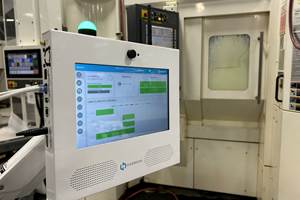Task Simplification Or Increased Training?
I’ve written about task simplification in several of my previous columns. Task simplification lowers the skill level required of a person performing a task, minimizes the potential for mistakes and shortens the time required to perform the task.
Share





I’ve written about task simplification in several of my previous columns. Task simplification lowers the skill level required of a person performing a task, minimizes the potential for mistakes and shortens the time required to perform the task. While the basic principles of task simplification apply to any task performed by any person, I’ve placed the highest emphasis on tasks performed by CNC operators.
Whenever I’ve written about this topic, I’ve received responses from manufacturing people who question how much a CNC operator must know in order to run a CNC machine. These people often begin their argument with the statement “Any CNC operator worth his salt should be able to _____.” Readers can fill in the blank for the task being discussed. For example, if we’re talking about simplifying the task of offset entry, then the common response is “Any CNC operator worth his salt should be able to determine the correct deviation and enter it into the appropriate offset.”
Let’s examine some of the aspects of task simplification.
Lower the skill level required of the person performing the task. Whether you like it or not, the vast majority of people entering the field of manufacturing, especially as CNC operators, have little or no manufacturing experience. When faced with entry-level operators that have no previous CNC experience, you have three choices: First, you can raise their skill level so they may proficiently perform the tasks (preferably before putting them on a CNC machine tool). Second, you can lower the skill level required to perform the related tasks. Third, you can do both—and in most applications, this is your best choice.
Raising the skill level involves training. CNC operators should understand all facets of the tasks they perform. This means they should understand enough about CNC machines to master their operation. However, this level of understanding can be difficult to achieve prior to using a CNC machine in a production run. You can often achieve the desired result by lowering the level of skill required to perform tasks. The less a CNC operator must know, the quicker he or she will become proficient.
Admittedly, I’m taking the viewpoint of a company manager. As a manager, you want your people, especially new people, to become proficient in their tasks as quickly as possible. I believe that CNC operators must be more than button pushers. The more they understand about the machines they run, the better operators they can be. However, when the majority of your CNC operators are entry level, providing the necessary training and assessment can be challenging. Minimizing what people must know makes it easier to get them up to speed quickly.
Minimize the potential for mistakes. The more complicated a task is, the more likely mistakes will be made. This is true of any task—including all tasks related to running CNC machines. Skill level, of course, is inversely proportional to the potential to make mistakes. The lower the skill level, the more likely mistakes will be made. Simplifying tasks is an obvious way to minimize the potential for mistakes.
Judging the potential for improvement in your own company is simple. What kinds of problems currently occur in your shop? Scrapped parts, crashed machines and wasted time are obvious symptoms of mistakes. Simplifying the related tasks will reduce the number of mistakes being made.
When faced with what we consider to be too many basic mistakes, our tendency as human beings is to place blame with the people who made them. Instead, you should provide training to increase skill levels or you should simplify the related tasks. Again, either will minimize the potential for mistakes.
Speed up the task. In most cases, the easier it is to perform a given task, the quicker it can be completed. This is often my answer to people that make the “Any CNC operator worth his salt . . .” statement. Just because an operator should be able to do something doesn’t mean he or she should have to do it on a regular basis.
My example is related to tolerance interpretation. I concede that any CNC person should be able to determine the target value for any dimension he or she is expected to hold (the target dimension is often the mean value for the tolerance band). Depending upon how dimensions are specified on your drawings, it can take time to determine the target value. If you specify the target value, then you lower the skill required to make offset adjustments, minimize the potential for mistakes and speed up the task of making offset adjustments.
Related Content
Finding the Right Tools for a Turning Shop
Xcelicut is a startup shop that has grown thanks to the right machines, cutting tools, grants and other resources.
Read MoreAddressing the Manufacturing Labor Shortage Needs to Start Here
Student-run businesses focused on technical training for the trades are taking root across the U.S. Can we — should we — leverage their regional successes into a nationwide platform?
Read MoreHow I Made It: Amy Skrzypczak, CNC Machinist, Westminster Tool
At just 28 years old, Amy Skrzypczak is already logging her ninth year as a CNC machinist. While during high school Skrzypczak may not have guessed that she’d soon be running an electrical discharge machining (EDM) department, after attending her local community college she found a home among the “misfits” at Westminster Tool. Today, she oversees the company’s wire EDM operations and feels grateful to have avoided more well-worn career paths.
Read MoreCan Connecting ERP to Machine Tool Monitoring Address the Workforce Challenge?
It can if RFID tags are added. Here is how this startup sees a local Internet of Things aiding CNC machine shops.
Read MoreRead Next
Registration Now Open for the Precision Machining Technology Show (PMTS) 2025
The precision machining industry’s premier event returns to Cleveland, OH, April 1-3.
Read More5 Rules of Thumb for Buying CNC Machine Tools
Use these tips to carefully plan your machine tool purchases and to avoid regretting your decision later.
Read MoreSetting Up the Building Blocks for a Digital Factory
Woodward Inc. spent over a year developing an API to connect machines to its digital factory. Caron Engineering’s MiConnect has cut most of this process while also granting the shop greater access to machine information.
Read More
.jpg;width=70;height=70;mode=crop)




















.jpg;maxWidth=300;quality=90)









